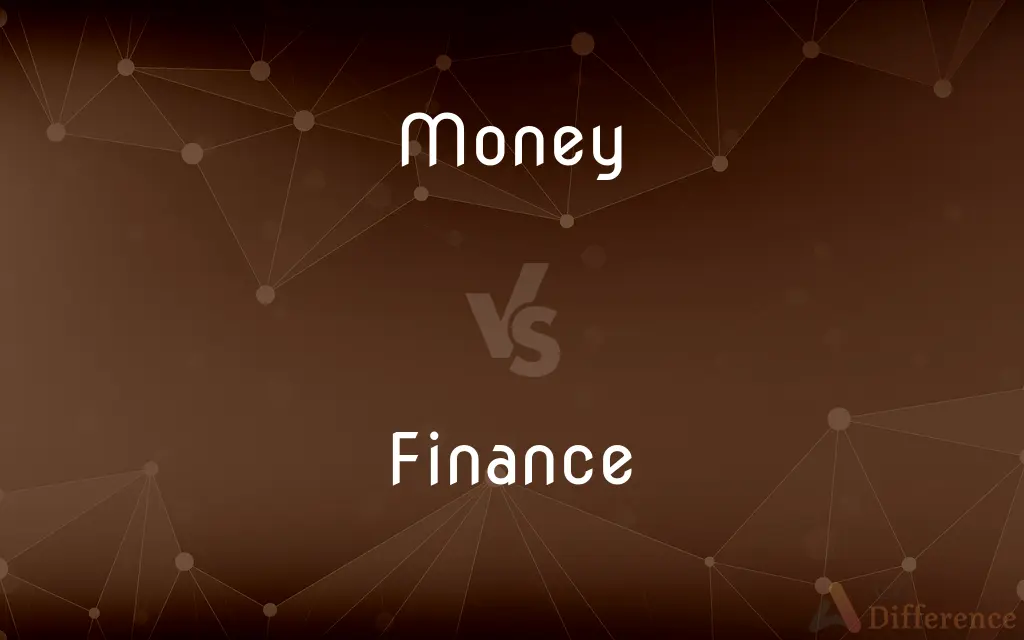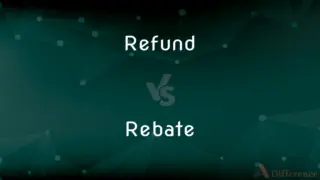Money vs. Finance — What's the Difference?
Edited by Tayyaba Rehman — By Fiza Rafique — Updated on November 3, 2023
Money is a medium of exchange for goods and services, whereas finance is the management of money and investments.

Difference Between Money and Finance
Table of Contents
ADVERTISEMENT
Key Differences
Money serves as a medium of exchange, a store of value, and a unit of account. It is tangible and can be held and exchanged. Finance, on the other hand, is an intangible concept that refers to the system of managing funds, which includes the creation, management, and investment of money.
Money is involved in daily transactions and is the lifeblood of commerce. Finance looks beyond mere transactions to the strategies that allocate monetary resources over time. While money is the currency used to facilitate trade, finance is the field that studies how money is directed to future growth and stability.
In terms of functionality, money acts as a lubricant that facilitates trade and market operations. Finance encompasses banking, leverage, credit, capital markets, and the instruments and processes used for managing risk and resources.
The physical representation of money comes in the form of coins, notes, or digital entries. In contrast, finance is represented through financial statements, market analyses, and investment portfolios. It is the architecture that oversees the flow of money within and between entities.
Lastly, money has a direct and immediate influence on individuals' and businesses' ability to make purchases and sales. Finance is concerned with the broader scope of ensuring that there is a plan for that money over time, focusing on saving, borrowing, investing, and forecasting.
ADVERTISEMENT
Comparison Chart
Definition
Medium of exchange and value.
Management and study of money and assets.
Function
Facilitates transactions.
Plans and directs monetary resources.
Form
Coins, notes, digital currency.
Financial statements, investments, policies.
Scope
Immediate purchasing power.
Long-term financial growth and stability.
Discipline
Often considered a part of finance.
Encompasses money, banking, and investments.
Compare with Definitions
Money
Currency.
The money in Europe is the euro.
Finance
Investment Study.
His finance portfolio grew by 10%.
Money
Medium of Exchange.
She saved money for a new car.
Finance
The management of money, banking, investments, and credit.
Money
Store of Value.
His money depreciated with inflation.
Finance
Resource Allocation.
The company restructured its finance department.
Money
Unit of Account.
They counted the money after the fundraiser.
Finance
Financial Activities.
The CFO is responsible for the organization’s finance.
Money
Money is any item or verifiable record that is generally accepted as payment for goods and services and repayment of debts, such as taxes, in a particular country or socio-economic context. The main functions of money are distinguished as: a medium of exchange, a unit of account, a store of value and sometimes, a standard of deferred payment.
Finance
Capital Management.
They took a course in personal finance.
Money
Legal Tender.
He withdrew money from the ATM.
Finance
Finance is a term for matters regarding the management, creation, and study of money and investments. Specifically, it deals with the questions of how an individual, company or government acquires money – called capital in the context of a business – and how they spend or invest that money.
Money
A medium that can be exchanged for goods and services and is used as a measure of their values on the market, including among its forms a commodity such as gold, an officially issued coin or note, or a deposit in a checking account or other readily liquefiable account.
Finance
Finances Monetary resources
Could not make the purchase because of limited finances.
Money
The official currency, coins, and negotiable paper notes issued by a government.
Finance
The supplying of funds or capital.
Money
Assets and property considered in terms of monetary value; wealth.
Finance
To provide or raise the funds or capital for
Financed a new car.
Money
Pecuniary profit or loss
He made money on the sale of his properties.
Finance
To supply funds to
Financing a daughter through law school.
Money
One's salary; pay
It was a terrible job, but the money was good.
Finance
The management of money and other assets.
Money
An amount of cash or credit
Raised the money for the new playground.
Finance
The science of management of money and other assets.
Money
Often moneys, monies Sums of money, especially of a specified nature
State tax moneys.
Monies set aside for research and development.
Finance
Monetary resources, especially those of a public entity or a company.
Who's really in charge of a democracy's finances?
Money
A wealthy person, family, or group
To come from old money.
To marry into money.
Finance
The provision of a loan, payment instalment terms, or similar arrangement, to enable a customer to purchase an item without paying the full amount straight away.
Finance on all our new cars is provided by ABC Loans Ltd.
Money
A legally or socially binding conceptual contract of entitlement to wealth, void of intrinsic value, payable for all debts and taxes, and regulated in supply.
Finance
(intransitive) To conduct, or procure money for, financial operations; manage finances.
Money
A generally accepted means of exchange and measure of value.
I cannot take money, that I did not work for.
Before colonial times cowry shells imported from Mauritius were used as money in Western Africa.
Finance
To pay ransom.
Money
A currency maintained by a state or other entity which can guarantee its value (such as a monetary union).
Money supply;
Money market
Finance
(transitive) To manage financially; be financier for; provide or obtain funding for a transaction or undertaking.
His parents financed his college education.
He financed his home purchase through a local credit union.
Money
Hard cash in the form of banknotes and coins, as opposed to cheques/checks, credit cards, or credit more generally.
Finance
To extort ransom from.
Money
The total value of liquid assets available for an individual or other economic unit, such as cash and bank deposits.
Finance
The income of a ruler or of a state; revenue; public money; sometimes, the income of an individual; often used in the plural for funds; available money; resources.
All the finances or revenues of the imperial crown.
Money
Wealth; a person, family or class that possesses wealth
Finance
The science of raising and expending the public revenue.
Money
An item of value between two or more parties used for the exchange of goods or services.
Finance
To conduct the finances of; to provide for, and manage, the capital for; to financier.
Securing foreign capital to finance multitudinous undertakings.
Money
A person who funds an operation.
Finance
The commercial activity of providing funds and capital
Money
A piece of metal, as gold, silver, copper, etc., coined, or stamped, and issued by the sovereign authority as a medium of exchange in financial transactions between citizens and with government; also, any number of such pieces; coin.
To prevent such abuses, . . . it has been found necessary . . . to affix a public stamp upon certain quantities of such particular metals, as were in those countries commonly made use of to purchase goods. Hence the origin of coined money, and of those public offices called mints.
Finance
The branch of economics that studies the management of money and other assets
Money
Any written or stamped promise, certificate, or order, as a government note, a bank note, a certificate of deposit, etc., which is payable in standard coined money and is lawfully current in lieu of it; in a comprehensive sense, any currency usually and lawfully employed in buying and selling.
Finance
The management of money and credit and banking and investments
Money
Any article used as a medium of payment in financial transactions, such as checks drawn on checking accounts.
Finance
Obtain or provide money for;
Can we finance the addition to our home?
Money
Any form of wealth which affects a person's propensity to spend, such as checking accounts or time deposits in banks, credit accounts, letters of credit, etc. Various aggregates of money in different forms are given different names, such as M-1, the total sum of all currency in circulation plus all money in demand deposit accounts (checking accounts).
Finance
Sell or provide on credit
Money
In general, wealth; property; as, he has much money in land, or in stocks; to make, or lose, money.
The love of money is a root of all kinds of evil.
Finance
Money Management.
She majored in finance.
Money
To supply with money.
Money
The most common medium of exchange; functions as legal tender;
We tried to collect the money he owed us
Money
Wealth reckoned in terms of money;
All his money is in real estate
Money
The official currency issued by a government or national bank;
He changed his money into francs
Common Curiosities
Why is finance important?
It's crucial for making informed decisions about the allocation of resources and investments for future stability and growth.
Can finance exist without money?
No, finance inherently involves the handling of money.
How do interest rates relate to finance?
They are a core part of finance, affecting borrowing costs and investment yields.
Is cryptocurrency considered money?
It functions as money in certain contexts but is not legal tender in many jurisdictions.
What is money?
It's an official medium of exchange and store of value.
What is finance?
It's the management, creation, and study of money, banking, credit, investments, assets, and liabilities.
What are the different forms of money?
Cash, coins, banknotes, and electronic currency.
Is money always in the form of physical currency?
Not always; it can also be digital or other forms of legal tender.
Is gold considered money?
Historically yes, but currently it's more of a commodity or investment asset.
Can finance help with personal savings?
Yes, personal finance strategies are key to effective saving.
Does money have intrinsic value?
Typically, its value is not intrinsic but assigned by government decree.
What areas does finance cover?
Personal finance, corporate finance, public/government finance, and international finance.
Do all jobs in finance require dealing with money directly?
Not directly; some deal with risk, data analysis, or policy, which are indirectly related to money management.
What role does the government play in money?
It issues currency and sets monetary policy.
What's a common goal in finance?
To maximize the value of assets or wealth.
Share Your Discovery

Previous Comparison
Druggist vs. Chemist
Next Comparison
Refund vs. RebateAuthor Spotlight
Written by
Fiza RafiqueFiza Rafique is a skilled content writer at AskDifference.com, where she meticulously refines and enhances written pieces. Drawing from her vast editorial expertise, Fiza ensures clarity, accuracy, and precision in every article. Passionate about language, she continually seeks to elevate the quality of content for readers worldwide.
Edited by
Tayyaba RehmanTayyaba Rehman is a distinguished writer, currently serving as a primary contributor to askdifference.com. As a researcher in semantics and etymology, Tayyaba's passion for the complexity of languages and their distinctions has found a perfect home on the platform. Tayyaba delves into the intricacies of language, distinguishing between commonly confused words and phrases, thereby providing clarity for readers worldwide.















































